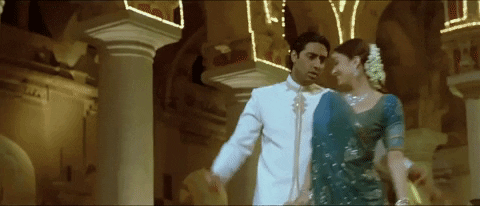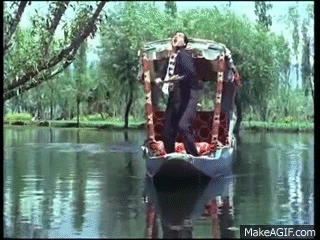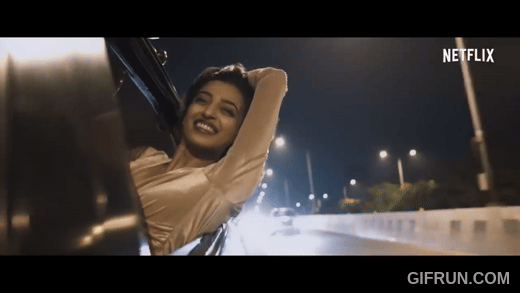My Hindi is not very good. In an effort to correct this, the husband and I have been challenging ourselves to talk in Hindi for five minutes without using any English words. Our speech slows down as we struggle to recall the Hindi words for ‘emotion’, or ‘dream’, or ‘compromise’. They are there, deep in the part of our minds that crammed synonyms for tenth standard board exams (sooraj: surya, ravi, prabhakar).1 But it takes time to fish them from those dusty corners, making conversation stilted.
My grasp on the language is enough, however, to understand that in the movie Silsila, when Amitabh Bachhan’s baritone delivers Javed Akhtar’s lines “Main aur meri tanhayi, aksar ye baatein karte hain/Tum hoti, toh kaisa hota”—there is more emotion in it than can be captured by the literal translation (“I and my loneliness, often discuss/how it would be if you were here.”).
Perhaps the wise thing to do is to leave that extra feeling there, in the Hindi/Urdu words, and not try to extract it into the language I am more comfortable with. Perhaps it is enough to marvel at the poetry in the original tongue. But there is some madness inside me; I can’t leave the words alone. About a year ago, I allowed this madness to drive me into attempting translations of five of my favourite Hindi songs, and now, it is time for another round.
The great Gulzar looms large in this world. The words ‘Jinke sar ho ishq ki chhaon/Paon ke neeche jannat hogi’2 were imprinted on the brain of every 90s kid before we had an inkling of what any of them meant. From 2000 to 2010, Gulzar wrote songs for 39 films, including Saathiya, Omkara, Guru, and Ishqiya—the mind boggles.

There is a hidden gem in the second stanza of Gulzar saab’s Bol Na Halke Halke, from the movie Jhoom Barabar Jhoom.
Aa neend ka sauda karein Ik khwaab dein, ik khwaab lein Ik khwaab toh aankhon mein hai, Ik chaand ke takiye tale Kitne dinon se ye aasmaan bhi Soya nahi hai, isko sula dein
Come, let's trade our sleep with the night A dream for a dream One dream from the brow One from Moon's pillow The sky has not slept For so many days Come, let's put it to sleep
The movie Kashmir ki Kali features an overwhelming number of songs in which Shammi Kapoor serenades Sharmila Tagore from a boat on Dal Lake.
One of them, written by Shamsul Huda Bihari, is Deewaana Hua Badal.
Jab tumse nazar takraayi sanam, Jazbaat ka ik toofaan utha Tinke ki tarah main beh nikli Sailaab mere roke na rukaa Jeevan mein machi halchal Aur bajne lagi shahnayi Ye dekh ke dil jhooma Li pyaar ne angdai
My gaze, wandering, met yours My heart rose in a storm And I, a twig, floating in it Could not stop the flood My heart danced To the storm's beat Love took me in its arms
The 2018 anthology film Lust Stories starts with a scene that takes me right back to my childhood in Bombay: Radhika Apte leans out of the window of a kaali peeli taxi, wind in her hair, smile on her face. Director Anurag Kashyap has paired this image with the opening strains of Dam Bhar Jo Udhar Moonh Phere from the 1951 movie Awara, written by Shailendra.
Dam bhar jo udhar moonh phere O chanda Main unse pyaar kar loongi Baatein hazaar kar loongi
O Moon, please look away For a moment So I may love him And say a thousand things
We end where we began, with Javed Akhtar and Ye Kahan Aa Gaye Hum, from the movie Silsila. I struggled with this one, and almost left it out—the English words seem to be but a shadow of the Hindi ones. Tanhayi is not only ‘loneliness’ but the thirst of a lover for their beloved, a desperation that comes from being utterly alone.3 This is less of a translation, and more of a lament for what has been lost in doing it.
Main aur meri tanhayi Aksar ye baatein karte hain Tum hoti, toh kaisa hota? Tum ye kehti, tum woh kehti Tum iss baat pe hairaan hoti Tum uss baat pe kitni hasti Tum hoti, toh aisa hota Tum hoti, toh waisa hota Main aur meri tanhaayi Aksar ye baatein karte hain
I ask myself How it would be If you were here. And I reply, It would be like this And it would be like that You would say this And laugh at that Myself and I, We talk about these things.

Will this translation exercise improve my Hindi? Probably not. For that, I need to practice speaking it. And maybe read a book or two. But now I can recall the Hindi words for emotion (jazbaat), dream (khwaab), and compromise (sauda) faster.
Words that all mean ‘sun’.
The opening lines of Chaiyya Chaiyya. A rough translation is ‘Those whose heads are in the shadow of love/Have their feet in heaven.’
Other Hindi and Urdu words do this too—‘pain’ will never be an adequate substitute for ‘dard’, and ‘beswaadi’ has worlds of meaning beyond ‘tasteless’. South Asians’ love of food borders on obsession. Beswaadi implies that the food is not worth eating; when used as an adjective for life, it is not worth living. The emotions of a subcontinent pour meaning into the word.







My Hindi improved a bit by watching YouTube content in Hindi. I really like Lallantop, especially any show there that has Saurabh Dwivedi in it. I also really like Vikas Divyakirti's videos on his Drishti IAS channel. Last but not the least, I would recommend Neelesh Misra's "slow interviews"
Lovely Translations... And come to think of it, I am losing my ability to converse in Hindi, too. Maybe I need to talk to my wife in Hindi too.
Or I can try to translate some songs. This essay has given me many ideas. Thanks for writing this.